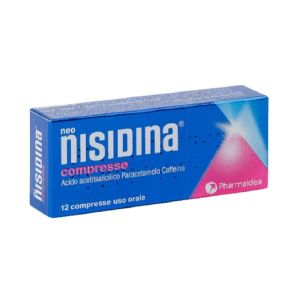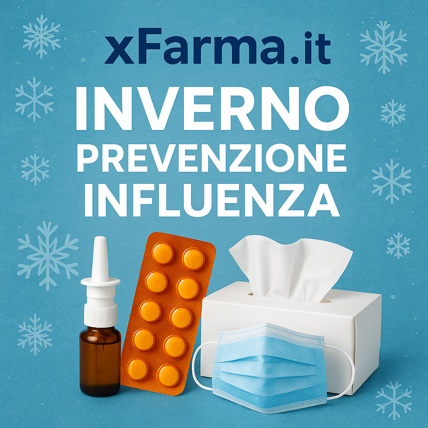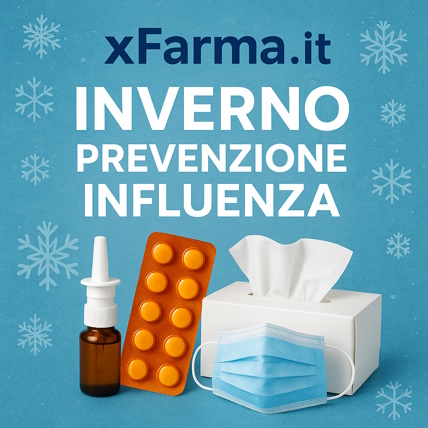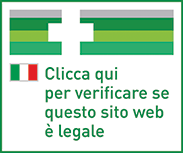Ship in Europe, Find out rates!
Neonisidine 12 Tablets

- box Delivery in Italy in 24/48 and free returns
- star3.000+ positive reviews
- dropboxOver 60,000 products in the catalog
Therapeutic indications
Neonisidine is a medicine to be used in the symptomatic treatment of headache, neuralgia, toothache, menstrual pain, joint pain, fever and cold syndromes.
Dosage and method of use
Neonisidine should be administered in adults in doses of 1 to 4 tablets per day. Oral intake should be done on a full stomach. Do not exceed the recommended doses, in particular elderly patients should follow the minimum dosages indicated above.
Contraindications
Hypersensitivity to the active substances or to any of the excipients;
Special warnings
Neonisidine should only be used on the advice of a doctor, who must carefully evaluate the relationship between the expected benefits and the possible risks, in case of:
The use of analgesics (pain relievers), especially in high doses, can cause headaches that should not be treated with higher doses of the drug. Correct use of this medicine does not expose you to the risk of a withdrawal syndrome; It is good to know, however, that abrupt discontinuation of prolonged high-dose analgesic therapy can cause a withdrawal syndrome (e.g. headache, fatigue, nervousness), which typically resolves within a few days. In these cases, the use of painkillers can only be resumed under close medical supervision.
People over the age of 70, especially in the presence of concomitant therapies, should only use this medicine after consulting their doctor. Do not administer for more than 3 consecutive days without consulting your doctor If pain or fever persists or worsens, new symptoms develop, or if there is redness or swelling, a doctor should be consulted as these may be signs of worsening of the disease in place.
Routine use of painkillers can cause long-term permanent kidney damage which can lead to kidney failure (analgesic nephropathy). Acetylsalicylic acid can decrease uric acid excretion and trigger a gout attack in susceptible individuals. Using acetylsalicylic acid can mask the signs of an infection.
This medicine contains acetylsalicylic acid, paracetamol and caffeine; before taking any other drug check that it does not also contain paracetamol as if this active ingredient is taken in high doses it can cause serious side effects. To prevent overdose, avoid co-administration with other drugs containing paracetamol. The simultaneous use of drugs containing painkillers or antipyretics (antipyretics) or non-steroidal anti-inflammatory drugs can be harmful to health. If you are already using one of these drugs NEO NISIDINE can only be taken after stopping the previous treatment and consulting your doctor.
Incorrect use of the medicine (for doses or for longer than those indicated) can cause serious damage, particularly to the liver, kidneys or blood, which could endanger the patient's life. This medicine is contraindicated in children and adolescents under the age of sixteen but if a viral infection such as influenza is suspected, Neonisidine should also not be used in adolescents aged 16 to 18 years. In these people there is a risk of developing Reye's syndrome, a rare but life-threatening disease. Reye's syndrome is characterized by non-infectious encephalopathy and liver failure and typically occurs after the acute signs of a viral infection (such as chicken pox or the flu) disappear. Clinical manifestations include vomiting, headache, and loss of consciousness.
The use of Neonisidine, as with any prostaglandin synthesis and cyclooxygenase inhibitor drug, is not recommended in women intending to become pregnant. The administration of NEO NISIDINE should be discontinued in women who have fertility problems or who are undergoing fertility investigations.
The medicine contains lactose - people with rare hereditary forms of galactose intolerance, lactase deficiency or glucose / galactose malabsorption should avoid taking this medicine due to the lactose present in the formulation.
Pregnancy and breastfeeding
Low dose acetylsalicylic acid (up to 100 mg / day)
Clinical studies indicate that doses up to 100 mg / day can be considered safe for use only in obstetrics, which requires specialist monitoring.
Doses of 100-500 mg / day of acetylsalicylic acid
There are insufficient clinical data regarding the use of doses above 100 mg / day up to 500 mg / day. Therefore, the recommendations below for doses of 500 mg / day and above also apply to this dose range
Doses of 500 mg / day or more of acetylsalicylic acid
Inhibition of prostaglandin synthesis can negatively affect pregnancy and / or embryo / fetal development; Results of epidemiological studies suggest an increased risk of miscarriage and cardiac malformation and gastroschisis after use of a prostaglandin synthesis inhibitor, in early pregnancy; The absolute risk of cardiac malformations was increased by less than 1%, up to approximately 1.5%.
It has been estimated that the risk increases with dose and duration of therapy. In animals the administration of prostaglandin synthesis inhibitors has been shown to
cause an increase in pre- and post-implantation loss and embryo-fetal mortality; In addition, an increased incidence of various malformations, including cardiovascular, has been reported in animals given prostaglandin synthesis inhibitors during the organogenetic period.
During the first and second trimester of pregnancy, the drug should not be administered except in strictly necessary cases. If acetylsalicylic acid is used by a woman attempting to conceive, or during the first and second trimester of pregnancy, the dose and duration of treatment should be maintained as closely as possible.
as low as possible. During the third trimester of pregnancy, all prostaglandin synthesis inhibitors can expose the fetus to: cardiopulmonary toxicity (with premature closure of the arterial duct and pulmonary hypertension); renal dysfunction, which can progress to renal failure with oligo-hydroamnios. The administration of the drug may expose the mother and the newborn, at the end of pregnancy, to: possible prolongation of the bleeding time and antiplatelet effect which can occur even at very low doses; inhibition of uterine contractions resulting in delayed or prolonged labor.
Consequently, neonisidine is contraindicated during the third trimester of pregnancy. Prolonged intake of high amounts of caffeine can induce miscarriage or premature birth.
Feeding time
Paracetamol and salicylates are excreted in breast milk. Caffeine is also excreted in breast milk and can affect the state and behavior of the baby. A risk to the infant cannot be excluded. The use of Neonisidine while breastfeeding should be avoided. A decision must be made whether to continue / discontinue breast-feeding or to continue / discontinue therapy taking into account the benefit of breast-feeding for the child and the benefit of therapy for the mother.
Expiration and retention
The expiry date refers to the product in intact packaging, correctly stored. Keep this medicine out of the reach and sight of children. Store at a temperature not exceeding 30 ° C
Warning: do not use the medicine after the expiry date indicated on the package.
Composition
Neonisidine contains, for each tablet:
Active ingredients: acetylsalicylic acid 250 mg, paracetamol 200 mg, caffeine 25 mg
Excipients: Corn starch, lactose, stearic acid.
| Destination | Cost | Detail |
|---|---|---|
| Italy | €5,90* | 24/72H |
| Austria, France, Germany, Slovenia | € 13* | 3 days |
| Belgium, Luxembourg, Portugal, Netherlands, Spain | € 14* | 4 days |
| Bulgary, Cechia, Hungary, Poland, Romania, Slovakia | € 19* | 5 days |
| Denmark, Estonia, Finland, Ireland, Lithuania, Latvia ,Sweden | € 22* | 5 days |
| United Kingdom, Switzerland, Greece, Malta/td> | € 30* | 7 days |
| Canada | € 40 | 7 Days |
European shipments with express courier: FedEx, MBE, DHL
*For the shipment outside band B ther's an extra cost of 22€ *For the shipment outside band C ther's an extra cost of 30€ Delivery Times exclude Saturday and Holidays
For Islands and Areas of difficult Accessibility the shipments are made in 72 hours and the cost will be increased by 15€


